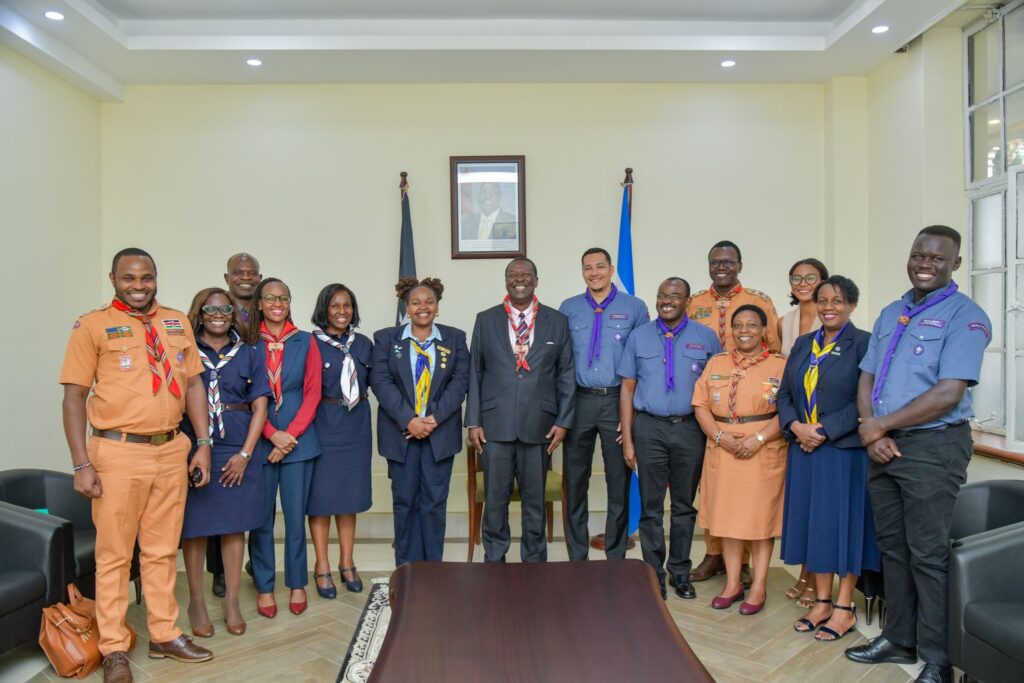Scouting in Kenya
Our Vision
To be the leading youth movement in Kenya developing well rounded citizens who are agents of change.
Our Mission
To contribute to the education of young people through a value system based on the Scout Promise and Law helping building a better world where people are self-fulfilled as individuals and play a constructive role in society.
History
The birth of the Scout Movement in Kenya came shortly after it started in the United Kingdom. The first Nairobi troop was formed at St. John’s Church (C.M.S.) Pumwani on November 24, 1910. In 1925 the first Eldoret troop was registered.
The first Kijabe (Kenton College) troop was registered in 1926. During this time, the troops formed were mainly composed of Europeans and Asians. The first African troop was formed at Alliance Boys High School under the name “First Kikuyu Troop” in 1927. At this time Scouts took part in activities and public services, such as helping the poor.
Kenya was not only the first country in Africa to start the Scout Movement, but was also the second home of BP, founder of the Scout Movement. He is quoted as saying that he always felt at the centre of things when in Kenya. He decided, therefore, to live in Kenya from October 1938 until his death on January 8, 1941 and was buried in Nyeri. This is why Nyeri County is so central not only to Kenya, but also to global Scouting.
Scouting Today
Since its establishment in 1910 the Kenya Scouts Association has grown into a dynamic Youth Movement and continues to mould and impact not only the lives of young people in Kenya, but that of the society as a whole. The Kenya Scouts Association is established under the Act of parliament CAP 219 of the Laws of Kenya.
It currently has a membership of over 4 million young people, boys and girls, and over 40,000 Adult Scout Leaders who support the young people in various capacities: as teachers, trainers, mentors, administrators, etc.
The Kenya Scouts Association is currently the largest Scout organization in Africa and is ranked 3rd globally.
The Kenya Scouts Association provides young people with opportunities to participate in programs, events, activities and projects that contribute to their growth as active citizens. Through these initiatives, young people become agents of positive change who inspire others to take action to create a better world. The Association aims at developing the youth at their formative ages so that they become responsible citizens through social, physical, intellectual and spiritual development.
The membership of over 4 million young people are spread out in all the 47 counties with about 97% being in the primary and secondary schools, tertiary institutions and the universities. The remaining 3% are young people who are out of school but in organized groups such as the religious institutions. For this reason, the Association works very closely with the Ministry of Education and the Teacher’s service Commission. The latter being because majority of the adult scout leaders are teachers in schools and colleges.
Principles of Scouting
Scouting in Kenya is based on the following principles:
-
1. Duty to God
Commitment to spiritual principles, loyalty to religion and accepting the duty resulting from that religion.
-
2. Duty to Others
Loyalty to one’s country in harmony with the promotion of Local, National and International Peace Co-operation.
-
3. Duty to Self
Responsibility for self-development
-
1. Duty to God
Commitment to spiritual principles, loyalty to religion and accepting the duty resulting from that religion.
-
2. Duty to Others
Loyalty to one’s country in harmony with the promotion of Local, National and International Peace Co-operation.
-
3. Duty to Self
Responsibility for self-development
Scouts in the country subscribe to The Scout Law which states that:
- A Scout’s honor is to be
- A Scout is a good citizen who respects God, own Country and
- A Scouts duty is to be useful and to help
- A Scout is a friend to all and a kin to every other Scout no matter to what Country, Community or religion the other may
- A Scout is kind and has respect for
- A Scout is kind to animals, learns about nature and is concerned with its
- A Scout obeys lawful orders of those in
- A Scout is cheerful and brave under all diffi
- A Scout makes good use of all
- A Scout is clean in appearance, thought, word and
Scout Method
To achieve the objectives, purpose and principles of the Movement the Scout Method is applied in the following ways:
1) Law & Promise
These are binding words of commitment by all Scouts to the values, beliefs and practices of Scouting.
2) Learning by Doing
This is a practical approach to effective learning that encourages self- development and self- reliance.
3) Patrol System
Scouts work in small groups, which provide effective participation of each member under the leadership of their peers.
4) Progressive Scheme
This is a System of learning and self-development through varied activities carried out by Scouts in accordance to one’s own interest.
5) Symbolic Framework
Through this framework, Scouts acquire identify by relating to their social-cultural background.
6) Adult –Youth Relationship
The Adult leader guides the youth as they carry out the youth programme activities.
7) Life in Nature
Outdoor activities are effectively carried out in a camping situation within a natural environment. Scouts get an opportunity to interact with nature.
1) Law & Promise
These are binding words of commitment by all Scouts to the values, beliefs and practices of Scouting.
2) Learning by Doing
This is a practical approach to effective learning that encourages self- development and self- reliance.
3) Patrol System
Scouts work in small groups, which provide effective participation of each member under the leadership of their peers.
4) Progressive Scheme
This is a System of learning and self-development through varied activities carried out by Scouts in accordance to one’s own interest.
5) Symbolic Framework
Through this framework, Scouts acquire identify by relating to their social-cultural background.
6) Adult –Youth Relationship
The Adult leader guides the youth as they carry out the youth programme activities.
7) Life in Nature
Outdoor activities are effectively carried out in a camping situation within a natural environment. Scouts get an opportunity to interact with nature.
Our Scout Section
There are four main sections of scouting in Kenya;
Age | Local Name | International Name |
6-11 years | Sungura Scouts | Cub Scouts |
12-15 years | Chipukizi Scouts | Junior Scouts |
16-18 years | Mwamba Scouts | Senior Scout |
19-26 years | Jasiri Scouts | Rover Scouts |
Scout Program Areas
- Life skills Development
- Physical and Health Education – Reproductive Health, Drug Demand Reduction, HIV/AIDS, etc
- Mental Health Education
- Environmental Conservation – tree growing, plastic waste management
- Peace Education and advocacy
- Smart Agriculture
- ICT – safe use of the internet, coding, creating, learning, making global friendships.
- Entrepreneurship
- Financial Literacy
- Citizenship
- Education Radicalization and violent extremism
- Mainstreaming young people with special needs: disabled, refugees, internally displaced, juvenile delinquents, orphaned, child-parents, etc
Adult Programme
Adults provide leadership in the implementation of the Youth Programme. They undertake various trainings to enable then carry out their roles effectively.
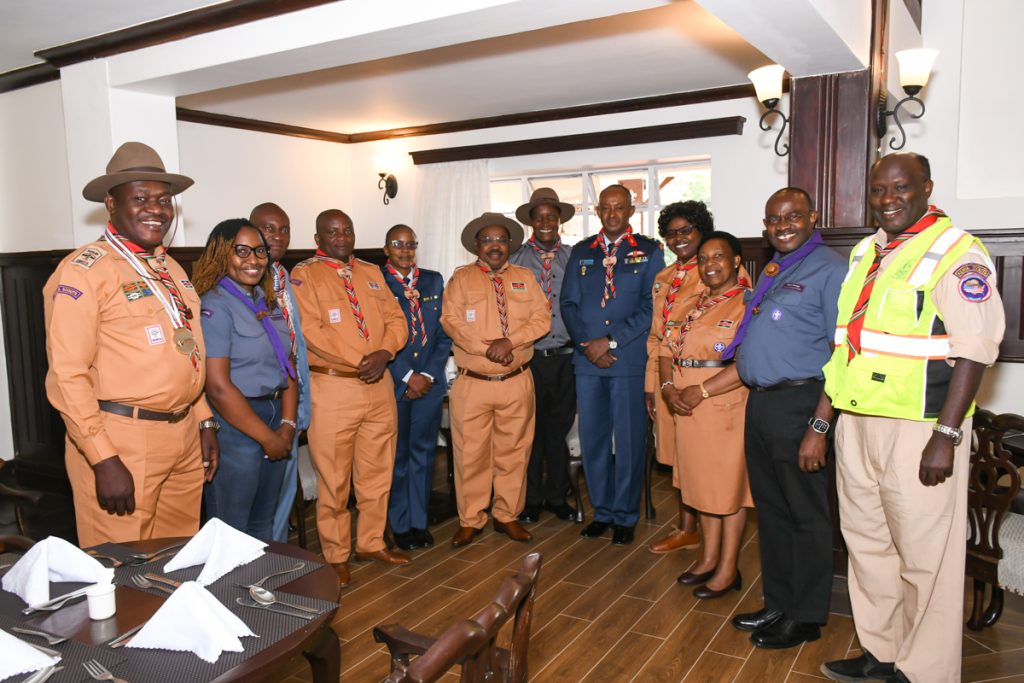
Our Commitment
We, the Kenya Scouts Association want to contribute in nurturing free, supportive, responsible and committed citizens who are needed to build a better Kenya.
These will be;
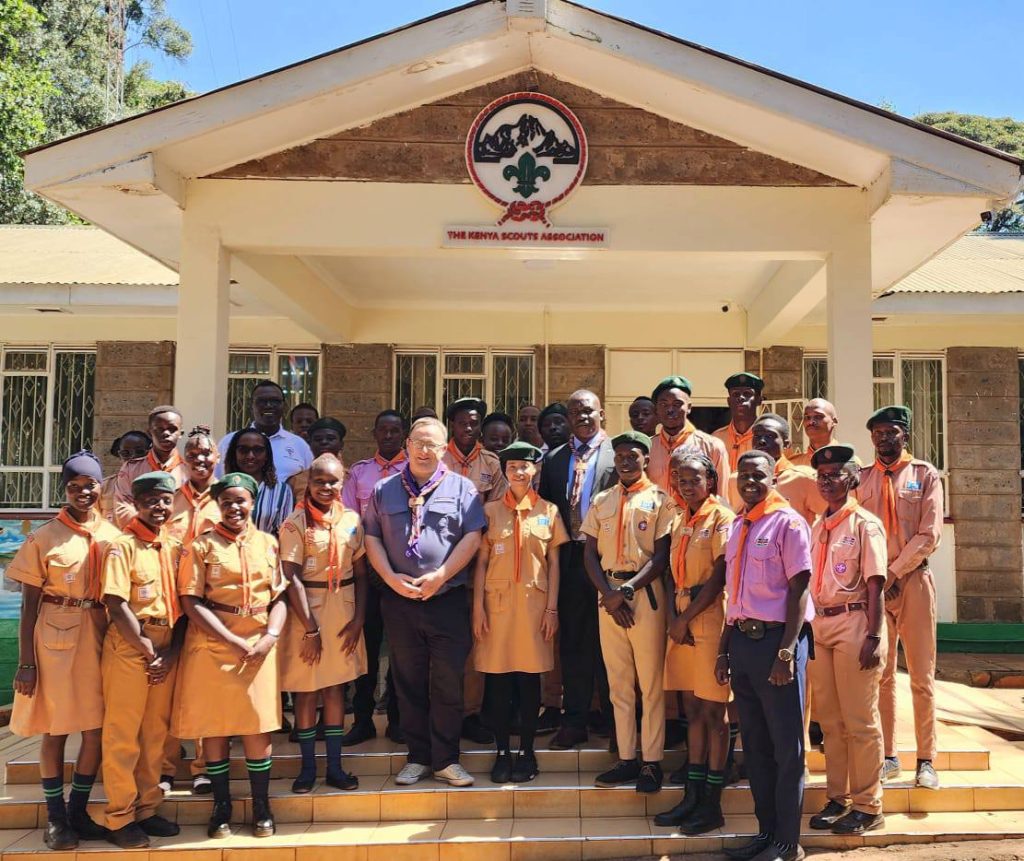
Men and women of character and integrity
Responsible and self-reliant, constant and true to the word, able to value human labour and build their family on love, aware of their own dignity and that of others, able to share with every- body joyfully and affectionately.
Agents of development
Ready to serve others, involved in their communities, defenders and respecters of their people’s rights pledged to democracy and committed to development, lovers of justice and promoters of peace.
Creative persons
Keen to leave the world better than they found it, able to strive for the integrity of the natural world, learning continually and searching for ways to solve problems and do their work well.
Spiritual people
Free from the hunger to possess, with a transcendental sense of life, able to open their hearts to God, live their faith joyfully and make it part of their daily life, open to dialogue and understanding and able to respect others’ cultural traditions and religious beliefs.
Governance
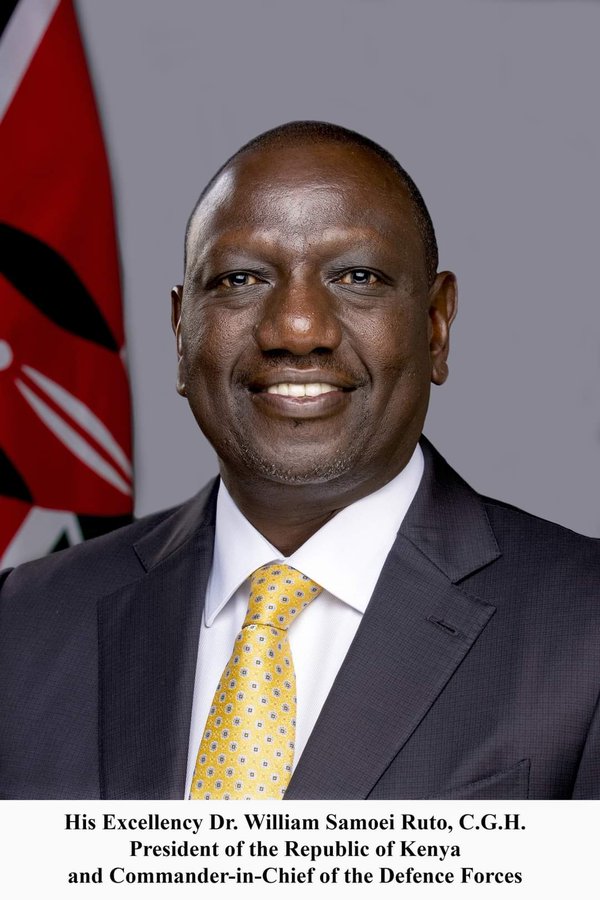
The Patron, Keya scouts association
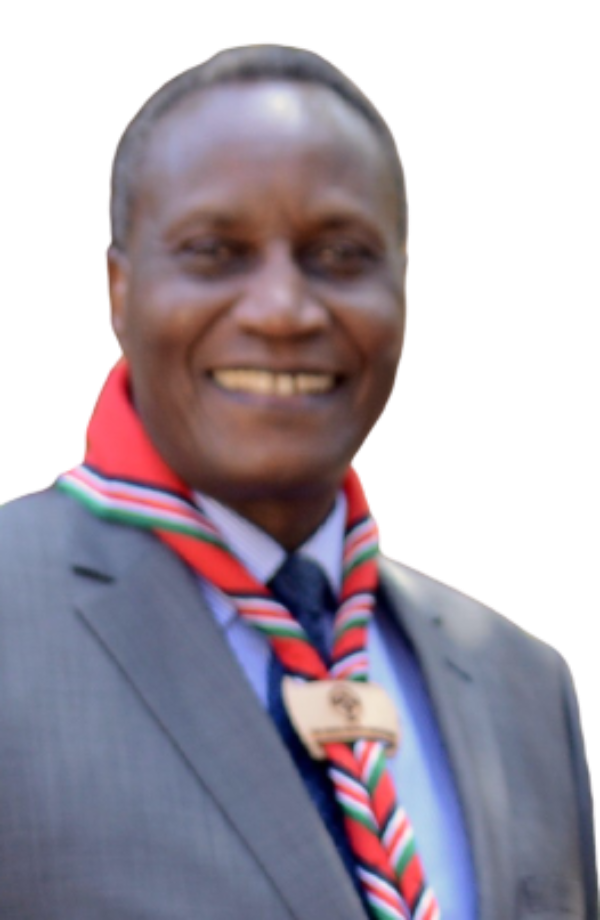
Amb. (Prof) Jacob T. Kaimenyi, EGH
Chief Scout of kenya
Chairman, National Scout Council (Highest Decision Making organ).
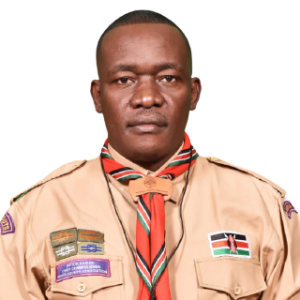
SWA,LT,SHUJAA Victor Radido
Chief Commissioner
Chairman, the National Scout Board (Policy, Strategy and Oversight Lead).
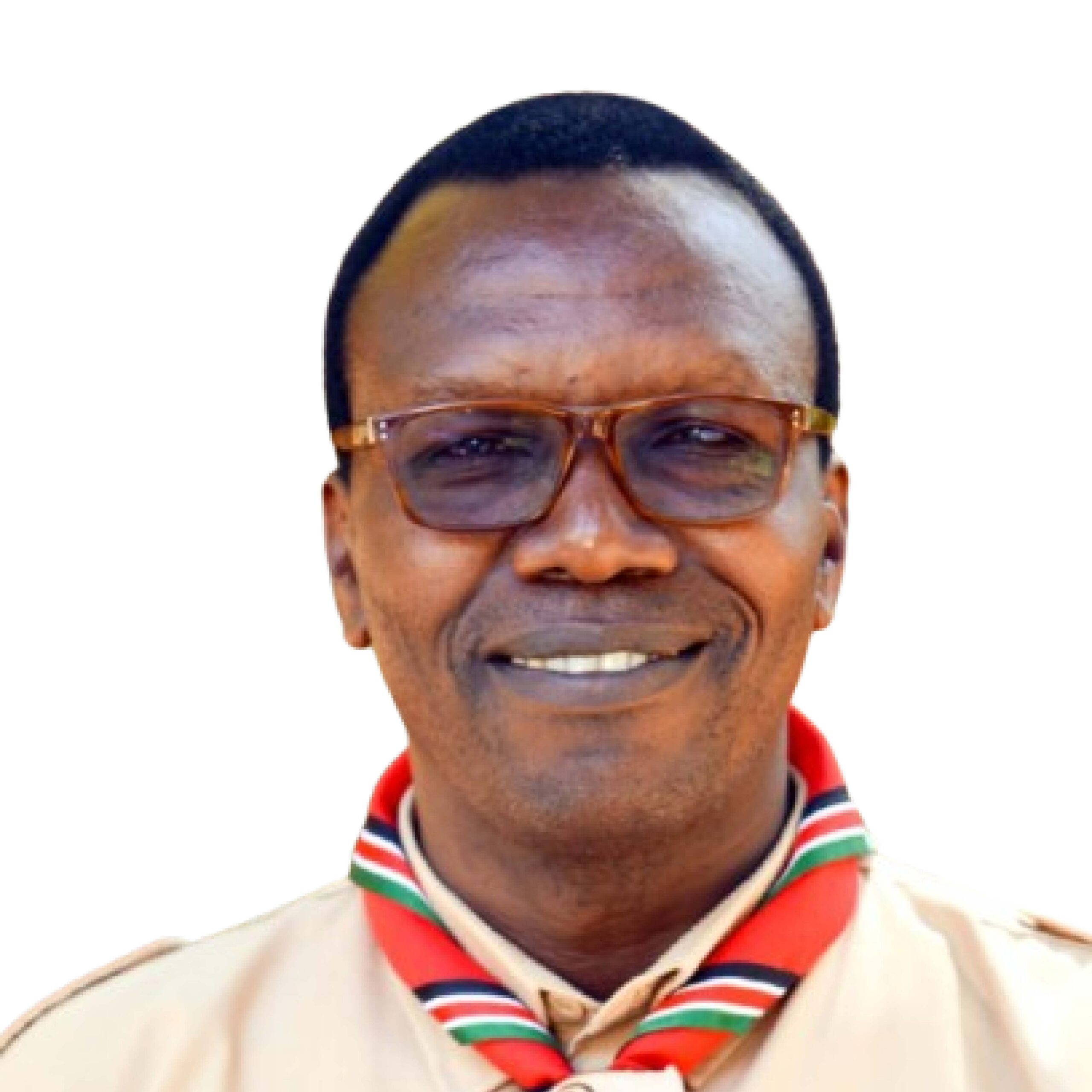
moses o. danda
Chief executive officer/national executive commissioner
Management/Implementing Lead.
Major Stakeholders
- The National Government: particularly Ministry of Education, Ministry of Youth Affairs, Sport and Arts, Teachers’ Service Commissions.
- County Governments
- World Organization of the Scout Movement (WOSM)
- Teacher Organizations: KEPSHA, KESSHA, KPSA
- Partners: UNICEF, KPA, CA(K), Rainforest Alliance, Compassion International, Linnex Training Institute, Wildlife Direct
- Parents of Scouts
